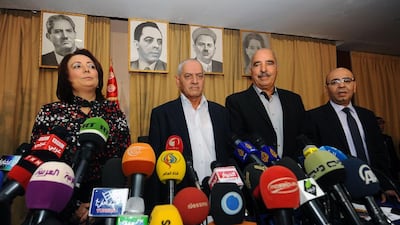On Friday the Nobel Peace Prize was awarded to the National Dialogue Quartet in Tunisia, a group of organisations that played a critical role in guiding the country towards stability with good governance and accountability. The choice is excellent and timely. It reminds the world of how much progress the country has made, how deep the challenges remain, and how much the international community has at stake in helping it to continue to move forward and avoid the pitfalls of violence, confrontation and corruption.
The four organisations are the Tunisian General Labour Union; the Tunisian Confederation of Industry, Trade and Handicrafts; the Tunisian Human Rights League and the Tunisian Order of Lawyers. But the Nobel committee rightly insisted that the award is for the quartet as a unit. This vital distinction recognises that what’s being rewarded is their willingness to work together and promote dialogue and cooperation. In another significant achievement, Tunisia has been recognised by the American NGO Freedom House as fully “free” in its latest report measuring civil rights and liberties around the world.
One can certainly understand why. Tunisia has adopted a new constitution by consensus, which is not perfect but which balances various interests in a constructive and reasonable manner that generally defaults towards protecting individual rights, including for women. It has held a series of free and fair, and genuinely contested, elections, with real campaigning and robust national debates about policy differences.
Even more significantly, last year came the peaceful transfer of power between the former troika government led by the Islamist Ennahda party and a new administration led by their secular rivals, the Nidaa Tounes party. The quartet played a crucial role in arranging for the most recent elections and then brokering this peaceful transfer of power.
Tunisians are an intelligent people, as demonstrated again by the reaction to the Nobel Prize. The general response has been expressions of pride, but almost immediately followed up by requests for international help. The thoughtful message being communicated is: “Thank you very much for this pat on the back, but what we really need is systematic help with our economy and counterterrorism efforts, which, by the way, are inextricably linked.”
The West and those Arab countries that are in a position to help, including Gulf countries, ought to do as much as possible to respond to this call. Tunisia is a model, not for revolution (which it really didn’t have, at least in the classical sense), but for evolution through dialogue, which is what actually took place after Zine El Abidine Ben Ali, the former president, was deposed.
If Tunisia’s experiment succeeds, it will be a major demonstration that evolution by consensus works better for everyone than revolution by force. The alternative model lies just across the border in Libya, where competing governments are fighting over everything. ISIL terrorists have just raised their hideous black banner over Sirte, the home town of former dictator Muammar Qaddafi, where they are starting to impose their demented form of fanatical misrule.
ISIL is a major threat to Tunisia, which has contributed more foreign fighters to the group than almost any other country. There is also a significant threat from several home-grown terrorist organisations, as was recently demonstrated by the attempted assassination of Ridha Charfeddine, a Nidaa Tounes MP. The country is still reeling from the 2013 assassinations of non-Islamist politicians Chokri Belaid and Mohamed Brahmi which helped bring down the Ennahda-led troika government. Earlier this year, over 50 people were killed in two major attacks by extremists in recent months, both of which targeted tourists and the crucial tourism industry.
Tunisia also desperately needs growth. Its private sector remains bogged down in excessive bureaucracy and interference by the government. It also needs help in the continuing struggle against corruption, which remains a huge challenge to both economic growth and political and social stability. The West ought to move quickly to establish free-trade agreements with Tunisia, and help it implement mechanisms to promote international investment. Investment conferences have proven effective in other cases. Arab states, too, can do more by way of both aid and direct foreign investment in Tunisia’s economy.
Both the West and the Arab world must recognise that promoting economic vitality in Tunisia constitutes a major counterterrorism initiative, as well as support for a positive, constructive model for change in the Arab world and, for that matter, Africa. In the Arab world today the areas dominated by ISIL fanatics occupy one dystopian extreme, and while Tunisia is hardly a utopia, it offers a better alternative.
Tunisia’s solutions are specific to Tunisia’s problems, and are not made for export. But the Tunisian example shows what’s generally possible when dialogue and compromise prevail over confrontation and violence. Tunisia deserves support for its own sake. But it’s also an important model of constructive Arab politics that all responsible actors should be clamouring to support and which cannot be allowed to fail.
Hussein Ibish is a senior resident scholar at the Arab Gulf States Institute in Washington
On Twitter: @ibishblog


